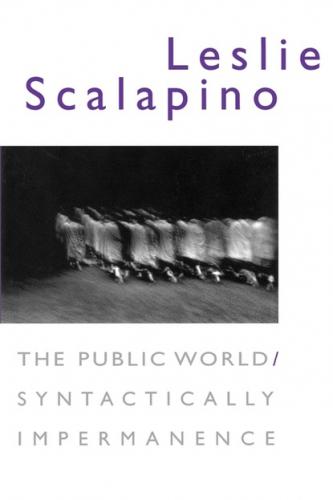The Public World/Syntactically Impermanence. Leslie Scalapino
on>
The Public World/Syntactically Impermanence
As: Nāgārjuna’s “destruction of all philosophical views”—obviously this would include all modes of articulation, and any definitions or procedures of “discourse.”
The Public World/Syntactically Impermanence
LESLIE SCALAPINO
Wesleyan University Press
Published by University Press of New England :: Hanover and London
Wesleyan University Press
Published by University Press of New England, Hanover, NH 0375 5
© 1999 by Leslie Scalapino
All rights reserved
Printed in the United States of America 5 4 3 2 1
CIP data appear at the end of the book
The author wishes to thank Tom White for his helpful reading of this text in manuscript.
A version of “The Cannon” was published in the American Poetry Review (Spring, 1998). “Experience/‘On’ Sight” is Leslie Scalapino’s part of an introduction to SIGHT, a collaboration by Lyn Hejinian and Leslie Scalapino, published by Edge Books. A version of “‘Thinking Serially’ in For Love, Words, and Pieces” was published in Objects in the Terrifying Tense/Longing from Taking Place, Leslie Scalapino (New York: Roof Books, 1993); and Disembodied Poetics: Annals of the Jack Kerouac School, edited by Anne Waldman and Andrew Schelling (Albuquerque: University of New Mexico Press, 1994). A version of “Footnoting” was published in SHARK. Passages from “The Radical Nature of Experience” on Philip Whalen appear in Leslie Scalapino’s introduction to Philip Whalen’s Overtime: The Selected Poems, edited by Michael Rothenberg (New York: Viking Penguin, 1999). A passage from “Silence and Sound/Text” appeared in Boundary.
A version of The Weatherman Turns Himself In was published by Zasterle Press, Canary Islands, Spain, 1995.
Passages from As: All Occurrence in Structure, Unseen—(Deer Night) were published in Chain, Explosive Magazine, Boundary, and Fishdrum.
Cover photograph: Untitled, Petah Coyne, 1993, gelatin silver print. Courtesy of the Artist and GalerieLelong, New York.
:: Contents
The Radical Nature of Experience 3
‘Thinking Serially’ in For Love, Words, and Pieces 44
The Recovery of the Public World 53
As: All Occurrence in Structure, Unseen
The Weatherman Turns Himself In 65
As: All Occurrence in Structure, Unseen—(Deer Night) 88
I could stay at home and I’d go out. There’d be a group of people in one setting or another who knew each other but gradually I began to feel withdrawn from them anyway.
It was easier to remember what had been said and I’d feel satisfied after going somewhere.
Other people seemed completely internal which I noticed when I’d observed a man for some time and saw that he’d say something about himself and I thought that he should be that entirely and that other people don’t go into a sort of public world.
I wanted to be wholly transparent so that I would tell people details of my activities whether I was casual or angry.
::
I feel that the people I see are all right—in the sense of not getting very old—as I get out of the area where there are shops, a few houses.
I don’t see them walk or move a great deal; and they wear good clothes or everyday clothes.
At the time a man doing construction work in the street comes in that slow delayed way; he is in a sort of public world, working for awhile. Then not working for periods of time possibly.
From Considering how exaggerated music is Leslie Scalapino (North Point Press, 1982)
Demonstration/Commentary
:: The Radical Nature of Experience
Activity is the only community. The conservative gesture, always a constant (any ordering, institutional and societal) is to view both activity and time per se as a condition of tradition. As such, both time and activity are a “lost mass” at any time. “For just as modern man has been deprived of his biography, his experience has likewise been expropriated.”1
My focus is on non-hierarchical structure in writing. For example, the implications of time as activity—the future being in the past and present, these times separate and going on simultaneously, equally active (in reference to Whalen’s writing, and similar to Dōgen’s conception of time and being)—suggest a non-hierarchical structure in which all times exist at once. And occur as activity without excluding each other. This is unrelated to social power (it can possibly transcend it) but is related to social intelligibility at some time. Social marginality is a state not producing necessarily, but related to, thought/form as discovery.
In Susan Howe’s poetry, “vault line divergence” (dual marginality?) is tracking of observation itself as making a present-time.
Lyn Hejinian described to me her work in progress, The Border Comedy, as being instigated by the notion of a collaboration in which one sends one line to someone else and the other person adds to it; yet in The Border Comedy she writes one line, then allows time to pass and comes back to it. But she was having trouble making the line unfamiliar to herself. She couldn’t get a line sufficiently unfamiliar, so began to work on all fifteen books of The Border Comedy (it is intended to be modeled on the fifteen books of Ovid’s Metamorphoses) at the same time, perhaps only returning to one spot in the work a couple of weeks after it was written and only looking at a few lines on the computer at once (in order not to ‘remember’ the background). “In order to keep writing fresh the memory of it has to fade. Unfamiliar, it is ‘of the moment.’”
In language horizontal and vertical time can occur at the same moment. Hejinian says that the unfamiliarity of the writing is a prompt; it prompts the future.
A lost mass (Paris gone) Shine red in young swallow’s mouth:
One of Philip Whalen’s poems might be written over a period of several years in a notebook, then typed and chopped into separate
